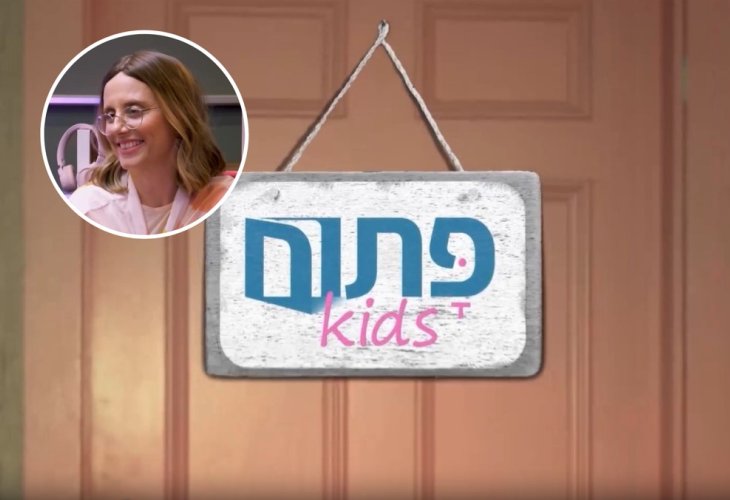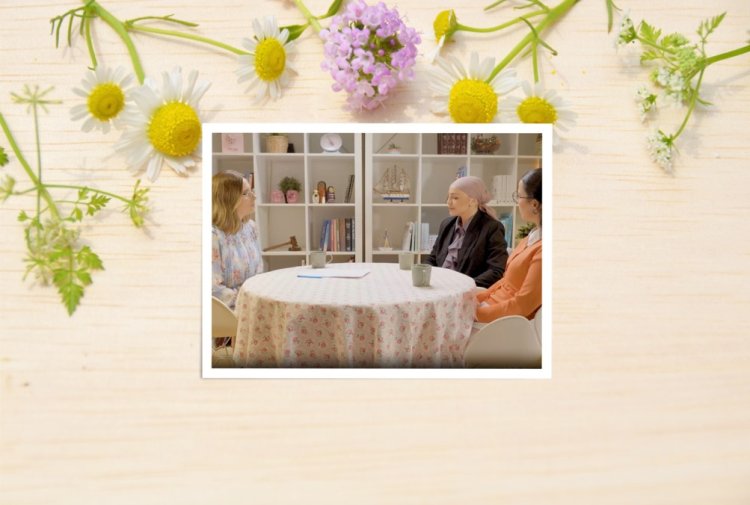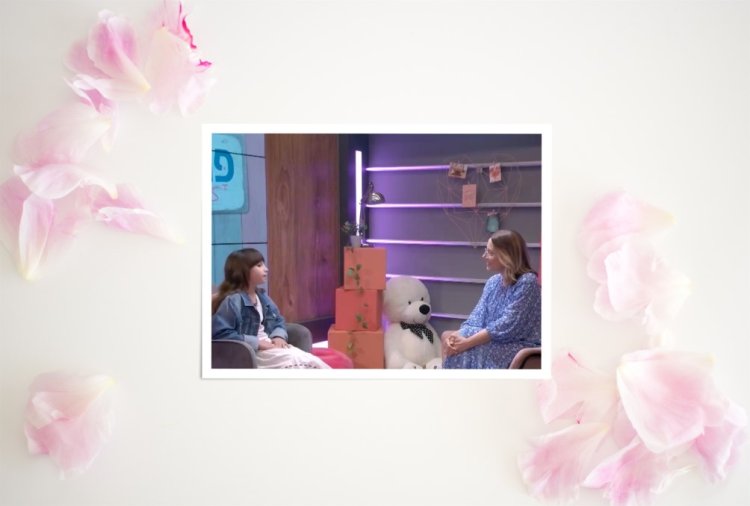Ban, Orphanhood, and Transition to First Grade: Efrat Barzel Discusses the 'Patuach Kids' Program
Efrat Barzel continues her open discussions, this time with young girls: Maya, who asked why she chose to be religious, Abigail with her secret notebook to Hashem, and a father who excitedly said behind the scenes, 'I've never heard my daughter speak like that before.'

When the program "Patuach" aired, Efrat Barzel never imagined how impactful it would become. "Topics that were once taboo started to be discussed," she says. "This happened both in people's private spheres, where they decided to address difficult topics in their lives, and in the media's engagement with these issues - in newspapers, podcasts, and various shows."
The heartfelt responses soon followed, sometimes from unexpected places. "Social work students were asked to watch relevant episodes of 'Patuach' for their assignments, college lecturers requested clips for their lessons. People sent me videos of themselves watching 'Patuach' on planes, and amid the current protests, in many groups of both religious and secular people I'm part of, 'Patuach' serves as a bridge. A soul is a soul across every society, and this program creates a shared peace between different sectors. Additionally, I still meet women at lectures, conferences, and retreats who tell me about their decision to address long-hidden or suppressed topics in their lives and deal with them appropriately."
 From 'Patuach'
From 'Patuach'
A Heart Sport Lesson
The wave of warm responses and the burning need from the field made it clear to Efrat that this goodness must continue. "Every Jewish home has the next generation - our children, and in every family, children need to talk openly with their parents," she explains. "When a child has no one to talk to or ask questions, they won't repress it internally but will seek someone else to talk to and ask. And when a child seeks answers in unfamiliar places, parents lose both the child and their connection with them. This creates a familial distance, which is the most painful thing. From this need arose the 'Patuach Kids' program, providing a space for open dialogue with children. We wanted to use the summer break to give young viewers and parents a taste of this."
What topics do you discuss with the children?
"Every child brought up a topic they were concerned about at that time and talked about it. Simple life issues that interest children everywhere. For example, one girl shared about quitting an artistic gymnastics class. Her mother didn't want her to leave, leading to a discussion about her desires versus her parents’. Another child talked about losing her father and shared about the farewell and longing. Additional topics included sibling relationships, transitioning from kindergarten to first grade, a girl who decided to hold a summer camp in her neighborhood, and more."
How did the children express their feelings in the program, considering they are just kids and don't always know how to articulate themselves?
"It turns out that a child can do it naturally if only given the chance. Later in life, we learn about shame, what's forbidden to say, the rules of love here, and then we start shutting down. Even in the program, there were many pre-shoot conversations, and sometimes it took a few minutes for the children to open up, but eventually, they did. In general, quite a few people told me that many children dream of appearing and speaking. So here we gave them that opportunity, within the right framework. All our programs are made in consultation with Torah scholars, maintaining the proper boundaries, and I feel that thanks to this adherence, there is a great blessing."
However, there were also concerns around the program. "We believed in the children's ability to open their hearts, but we didn't know if it would succeed during filming, nor did we know where the dialogue between us would lead," Efrat shares. "The interesting part is that during filming, the children started asking me questions, and often I became their interviewee. Eight-year-old Maya asked why I chose to be religious, and through that, she got a glimpse of the religious world behind the scenes. Michal asked how I became an interviewer, and I replied that it's a great question, which I've never been asked before. Each child in the program went on their journey. Abigail, for instance, told me about her secret notebook for Hashem."
While the children sat on the couch facing Efrat, their parents watched from the control room. "It was moving to see them," she recalls. "Children don’t always speak at home like they did in the studio, and there were moments when both the crew and the parents were deeply touched. The father of a girl who talked about social exclusion in her class approached us at the end and thanked us so much. He said, 'I’ve never heard my daughter speak like this.' Another girl, who got emotional and cried during the show, later told me, 'It was like a sport lesson for my heart.'"
Children today are used to watching drama-filled shows, what makes them watch a program with calmer discussions?
"Why do children watch dramas? Why does this generation seek out a lot of technological content and never feel satisfied? Because behind the search for dramas, a child is looking for an explanation for the drama happening inside them. No matter how many TikTok videos they watch or WhatsApp videos they open, ultimately, they're seeking an explanation for the emotions within them. So even if they watch two minutes of a conversation between an adult and a child, they learn a lot about themselves and the inner dialogue they have inside. And even if they just think to themselves, 'I wish I had an adult to talk to,' it’s already good. Personally, I'm less focused on ratings, and more important to me is touching hearts, and there - even touching the heart of one child or one girl is significant."
Interestingly, not only children watch the show. "A few days ago a seminary manager from Jerusalem called me and said she sits and watches the program like a study. 'I'm 60, and this is supposedly a children's show, why should I watch it?’ she told me, ‘But I subscribed to 'World of Children' for my grandchildren, and when I watch this dialogue, I learn how to talk to them.'"
 From 'Patuach Kids'
From 'Patuach Kids'
Conversations Over Iced Coffee
How do you get children to open up, not just on 'Patuach Kids', but also at home?
"Share with them about our feelings, the simplest ones. We come home from the grocery store, work, or taking out the trash, and report any emotional experience, like 'A cat jumped on me when I opened the trash, how startled I was!' No matter how silly it seems, this is how you get children to talk - by involving them in our world, telling them about us, without a word about them. This is how you become significant characters for them."
The good news is that it’s never too late to start. "Even if the child has already pulled away, conversations with parents continue to be significant for them. So, indeed, it's better to instill this from a young age, like eating, cleaning, and sleeping habits, but even if not - it’s worth starting at any stage. Often, we are busy with the phone, livelihood, preparing for Shabbat, and sometimes forget that all of this is for them. To ensure they come to us when contemplating a match or job choice, to truly be part of their inner world. Sometimes we forget how much these souls need us, and on their part, they're eagerly waiting."
The need for communication and sharing only grows with age. "In infancy, children need food and a clean diaper, but as they grow, they seek our life experiences, our emotional experiences. This is what empowers and equips them to cope. Even more than that - they need us, not only for us to be the first to celebrate their successes, but also so we can be the first to acknowledge their challenges. There's no one else for them except us."
A personal experience that Efrat had in this context took place during a family Shabbat at her home. "I sent a question to the Shabbat table that had bothered me for a long time as a mother. I asked my children - do you have enough of me? Six out of eight said yes, but two, the older ones, told me ‘No, Mom, we don’t have enough. We miss you, we want to be with you more.’ This opened up a very painful discussion, full of tears, and allowed us to speak about what’s still incomplete. From this conversation, I was blessed with two amazing initiatives, which I don’t know how to thank Hashem for. One, upon the advice of my son Yehali, who is married and a student at Lomza Yeshiva. He told me - cut down ten percent of what you do, and we'll be together more. And I really did it - I canceled lectures, stopped answering phones. I’m much more at playgrounds and more at home, without feeling confused. Thanks to him, I learned to say 'no,’ 'I can't.’ And Maya, who is 26 and was the second complainer, asked me to do a joint podcast with her, where we discuss close relationships between mothers and daughters. For the podcast, which will soon be launched, my youngest daughter suggested the title 'Come Mom, Sit With Me Even When I Grow Up.' Because small children need us, but older children need us no less."
What should parents talk about with their children?
"About nothing. Don’t wait until there are problems and then sit down for a family talk. Difficult issues certainly require a conversation, but primarily talk about nothing - about trivial things like how to sum up the last school year, what covers the books should have next year, what design is on the pencil case, and how tasty iced coffee is. This is how you create a connection, so they will come to talk to us about their more significant issues as well."
Here, Efrat sharpens a point. "The principle is not just to talk openly, but to feel, each parent according to their measure and the measure of the home if the level of openness and communication at home is right, or if quietly, without the children's saying, they desire more. There's no norm here, rather an inner listening, what is right for me, what is right for my children, from where I am and from a desire to progress."
The benefit from all of this is not only for the children. "They certainly gain, Efrat says, "but the greatest beneficiaries of this open dialogue are actually us, the parents. Because with all the coaches, methods, and courses, our greatest life coaches are our children. Our parenting meets our childhood and that of our children, and precisely from where it’s hard for us, the vulnerable and wounded places within us signal. I meet in the clinic childhood injuries that turned into motherhood challenges, and this dialogue with the children allows us to develop emotionally and humanly, and to receive back our lives."
These days, Efrat is also working on her new book, which naturally touches on these points. "It’s a book entirely about connections - ours with ourselves, with our children, and with Hashem. I see a great need for knowledge in this area, which I call a 'sacred space.' The book is titled 'Now I Pray,' and it deeply deals with our family relationships, especially when there is disagreement among us. It addresses how children build their personalities, how we as children who grew up formed ours, and primarily - our bonding as Jews with Hashem - prayer. Ultimately, why do we work, provide, shop if not for being with this sacred entity called family?"

